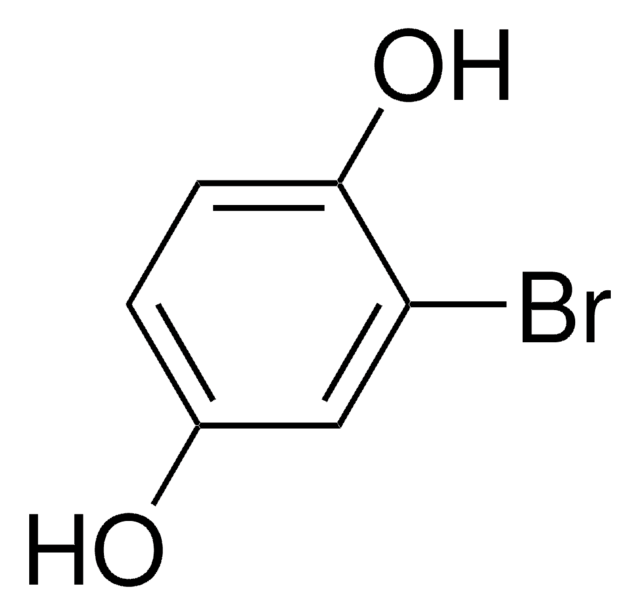224081
Chlorohydroquinone
technical grade, 85%
Synonym(s):
2-Chloro-1,4-dihydroxybenzene
Sign Into View Organizational & Contract Pricing
All Photos(2)
About This Item
Linear Formula:
ClC6H3-1,4-(OH)2
CAS Number:
Molecular Weight:
144.56
Beilstein:
636835
EC Number:
MDL number:
UNSPSC Code:
12162002
PubChem Substance ID:
NACRES:
NA.23
Recommended Products
grade
technical grade
Assay
85%
bp
263 °C (lit.)
mp
100-104 °C (lit.)
SMILES string
Oc1ccc(O)c(Cl)c1
InChI
1S/C6H5ClO2/c7-5-3-4(8)1-2-6(5)9/h1-3,8-9H
InChI key
AJPXTSMULZANCB-UHFFFAOYSA-N
Looking for similar products? Visit Product Comparison Guide
Signal Word
Danger
Hazard Statements
Precautionary Statements
Hazard Classifications
Eye Dam. 1 - Skin Irrit. 2 - Skin Sens. 1 - STOT SE 3
Target Organs
Respiratory system
Storage Class Code
11 - Combustible Solids
WGK
WGK 3
Flash Point(F)
Not applicable
Flash Point(C)
Not applicable
Personal Protective Equipment
dust mask type N95 (US), Eyeshields, Gloves
Choose from one of the most recent versions:
Already Own This Product?
Find documentation for the products that you have recently purchased in the Document Library.
Customers Also Viewed
Carolyne Caetano Gonçalves et al.
Frontiers in microbiology, 11, 1081-1081 (2020-06-26)
Lignin is an abundant cell wall component, and it has been used mainly for generating steam and electricity. Nevertheless, lignin valorization, i.e. the conversion of lignin into high value-added fuels, chemicals, or materials, is crucial for the full implementation of
Vincent Libis et al.
ACS synthetic biology, 5(10), 1076-1085 (2016-10-22)
Detection of chemical signals is critical for cells in nature as well as in synthetic biology, where they serve as inputs for designer circuits. Important progress has been made in the design of signal processing circuits triggering complex biological behaviors
Z Mehmood et al.
Chemosphere, 34(11), 2281-2291 (1997-06-01)
The metabolism of the environmental pollutant and hepatocarcinogen 2,4-dichlorophenol (2,4-DCP) was studied using microsomal fractions and whole-cells of Saccharomyces cerevisiae containing human cytochrome P450 3A4. 2,4-DCP exhibited a typical type I substrate binding spectrum with a K, of 75 microM.
Guadalupe Albarrán et al.
Environmental science and pollution research international, 27(18), 22855-22864 (2020-04-24)
Radiation-induced degradation of chlorobenzene was conducted at 0.1, 0.4, 0.5, 0.7, and 1.0 mmol/dm3 concentrations in aerated environment and at 1.0 mmol/dm3 in oxygen-free and N2O-saturated solutions. The results demonstrated that the elimination of chloride is important when the solution is oxygen
Guadalupe Albarrán et al.
Environmental science and pollution research international, 26(17), 17055-17065 (2019-04-19)
Radiolytic oxidation of 2,4-dichlorophenol (2,4-DClP) in aqueous solutions demonstrated that ·OH predominantly adds to the unsubstituted positions of the aromatic ring and that elimination of chloride at the 4 position is important because the -OH group enhances the electron density
Our team of scientists has experience in all areas of research including Life Science, Material Science, Chemical Synthesis, Chromatography, Analytical and many others.
Contact Technical Service













